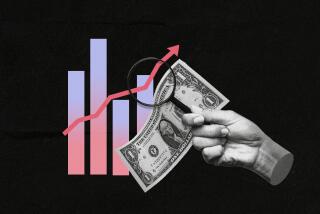Home Equity Encourages a Mind-Set of Wealth
- Share via
WASHINGTON--You may not be able to lose what you don’t have, but American homeowners sure do spend it, according to a new study from the National Assn. of Realtors, which found that the “unrealized gains” in home equity are the basis for many people’s wealth and financial decisions.
Unrealized gains are the accumulation of value in home equity. As the value of someone’s house increases year after year, so does his or her wealth--but only on paper.
That’s because equity is an illusory gain, which can’t be counted in hard cash unless the property is sold.
So if a property should happen to fall in value, the owner doesn’t really lose unless the property’s worth should fall below what was originally paid. But even then, the loss is strictly on paper, unless the owner actually sells.
Similarly, increases in value are paper gains that are realized only when the owner cashes out. Nevertheless, NAR found, unrealized gains have a measurable impact on behavior.
“Our survey finds that 16% of people with unrealized capital gains have changed their spending or saving behavior as a result,” said David Lereah, NAR’s chief economist. By contrast, just 3.4% of stockholders have altered their spending and saving habits because of the equity they have in their stocks.
Homeowners tap their paper profits in various ways. Almost half take it via home equity lines of credit or second mortgages, while 17% get to it by refinancing.
Some 16% use the money as a down payment for a second home, while 11% buy cars and 5% pay for their kids’ college education. However, more than four out of 10 use their cash to pay off or consolidate other debt, and 5% put it in the bank for safekeeping.
But what’s more important than how they get the money and how they spend it, according to Lereah, is that they do: Whereas stockholders spend just 3.8% of their stock market wealth, homeowners spend 10% to 18% of their home equity.
“The wealth effect is extremely important because real estate should help bring the recession to an end in a short period of time,” the economist said.
Also, people sometimes lose money in the stock market, but they rarely lose in the housing market, at least not on a year-over-year basis, according to NAR’s research.
Since March 2000, said Lereah, the stock market has “lost significant wealth,” something on the order of $5.5 trillion, from peak to trough. And that, he added, represents a “significant loss in potential spending.”
Real estate markets, on the other hand, have done just the opposite. In fact, housing prices have never fallen since NAR began keeping track of them in 1968. They came close during the 1990-91 recession, the economist said. But they’ve never dipped below what they were the year before.
When homeowners finally do cash out of their homes, they make some serious money, the NAR study also found. On average, they net about $20,000.
That’s far less than the $35,000 the Fed has said is the typical gain realized from the sale of a house. But given that there will be about 5.5 million existing-house sales this year alone, it still means some $110 trillion will be put back into the economy in 2001.
For the most part, the money will be used as a down payment for a next home or a vacation property. But 14% or so goes into goods, services or savings.
*
Lew Sichelman is a syndicated real estate columnist. He can be reached by e-mail at lsichelman@aol.com. Distributed by United Feature Syndicate.
More to Read
Inside the business of entertainment
The Wide Shot brings you news, analysis and insights on everything from streaming wars to production — and what it all means for the future.
You may occasionally receive promotional content from the Los Angeles Times.










